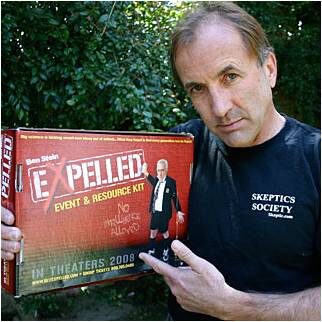Michael Shermer wrote an interesting article in which he, surely unwittingly, ends up placing himself into the very camp of those whom he seeks to besmirch.1
He notes,
The postmodernist belief in the relativism of truth, coupled to the clicker culture of mass media where attention spans are measured in New York minutes, leaves us with a bewildering array of truth claims packaged in infotainment units
And names, in part, the following:
Mysteries, magic, myths and monsters. The occult and the supernatural. Conspiracies and cabals. The face on Mars and aliens on Earth. Bigfoot and Loch Ness. ESP and PSI. UFOs and ETIs. JFK, RFK and MLK—alphabet conspiracies. Altered states and hypnotic regression. Remote viewing and astroprojection. Ouija boards and Tarot cards. Astrology and palm reading. Acupuncture and chiropractic. Repressed memories and false memories. Talking to the dead and listening to your inner child. Such claims are an obfuscating amalgam of theory and conjecture, reality and fantasy, nonfiction and science fiction. Cue dramatic music. Darken the backdrop. Cast a shaft of light across the host’s face. The truth is out there. I want to believe.
He seems to have forgotten atheism and the multiverse…or did he?
Keep in mind that we are dealing with Michael Shermer who adheres to the positive affirmation of God’s non-existence sect of atheism as he positively affirmed,
there is no God, intelligent designer, or anything resembling the divinity as proffered by the world’s religions.2

Michael Shermer referencing the movie that helped to expose him as a pseudo-skeptic when he positively affirmed that various academicians were not fired due to expressing views favorable to Intelligent Design only to be asked, “How do you know?”
and then falling apart as he admitted, “I don’t know.”
He notes:
What I want to believe based on emotions and what I should believe based on evidence does not always coincide….I conclude that I’m a skeptic not because I do not want to believe but because I want to know. I believe that the truth is out there. But how can we tell the difference between what we would like to be true and what is actually true? The answer is science.
Now, to an atheist the word, the mere mention of, “science” is tantamount to a Catholic hearing “ex-cathedra” or a starving person hearing “food is ready!” After uttering the word “science” you can say whatever you want and it will carry along with it the weight authority and adoration (this is even though science has utterly nothing to offer atheism).
Indeed, it is quite true that “What I want to believe based on emotions and what I should believe based on evidence does not always coincide.” Yet, he does, in fact, employ emotions into that which he wants to believe that into that which he does believe.
For example, in referring to the study of evolution he states that it was, “far more enlightening and transcendent, spiritual, than anything I had experienced in seven years of being a born again Christian.”3
What do emotions of enlightenment, transcendence and spiritual have to do with evolution?
Moreover, during his debate with Jonathan Wells “Why Darwin Matters”4 he referred to “the spiritual side of science” which he terms “sciensuality.”
Again, he is appealing to emotions and concocting a neo-Pagan form of science plus atheism (see here, here, here and here for examples).

Michael Shermer asserts,
Science begins with the null hypothesis, which assumes that the claim under investigation is not true until demonstrated otherwise.
Actually, science begins further back; with a metaphysical contention, with axioms that are not proven, nor evidenced but intuited and assumed—we are all metaphysicians. For elucidation on this point see the tripartite essay:
Atheism and Science – Is There a Relation?, part 1
Michael Shermer also makes some reasonable and true statements that are, none the less, conveniently self-serving:
In science, lots of mysteries are left unexplained until further evidence arises, and problems are often left unsolved until another day…In the meantime, it is okay to say, “I don’t know,” “I’m not sure” and “Let’s wait and see.”
Great! Now, I want to borrow that and state:
In theology, lots of mysteries are left unexplained until further evidence arises, and problems are often left unsolved until another day…In the meantime, it is okay to say, “I don’t know,” “I’m not sure” and “Let’s wait and see.”
Do you think that Michael Shermer would let a theist get away with that?
He also wrote:
To be fair, not all claims are subject to laboratory experiments and statistical tests. Many historical and inferential sciences require nuanced analyses of data and a convergence of evidence from multiple lines of inquiry that point to an unmistakable conclusion…
Once an inferential or historical science is well established through the accumulation of positive evidence, however, it is just as sound as a laboratory or experimental science.
Indeed, such as the overabundant evidence for the universe’s fine tuning—let us see what Mr. [pseudo]Skeptic has to say about that.
He states,
Show me the Intelligent Designer. Show me God. Show me, and I’ll believe.
Well, Mr. Shermer, you must understand that in theology, lots of mysteries are left unexplained until further evidence arises, and problems are often left unsolved until another day. In the meantime, I will say, “I don’t know how to show you God,” “I’m not sure how to do it” and “Let’s wait and see.” What we can show him is evidence of intelligent design. If I show you a computer I am showing you intelligent design even if I cannot even hope to find the particular person who intelligently designed it.
What if I stated this to Michael Shermer, “Show me air. Show me, and I’ll believe.” He cannot show me air, he can only show me the affect that wind has. He can show me swaying trees or dust being blown about and then he can claim that some invisible force called air is doing it.
What if I stated this to Michael Shermer, “Show me a dream. Show me, and I’ll believe.” He cannot show me a dream, he can only show me someone experiencing REM (rapid eye movement). He can show me a scan of someone’s brain and tell me that he knows that they are dreaming because this or that segment of the brain is active. But he cannot show me a dream.
That he requests to be shown God means that he is asking you to 1) accept his particular, and peculiar, theology and then 2) via his asserted theology, act to provide that which he requests. You see, to demand that God is something to be shown is to make theological claims about God namely, that God can be shown and this is something for which he presents no evidence—see Atheism’s arguments against theism, or Atheism’s “atheology” for more on this point.
